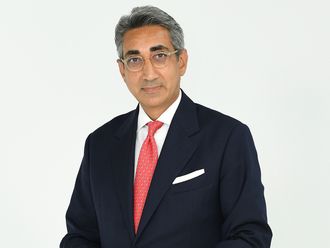London: More global banks are being investigated for the alleged financial market manipulation that led to fines of $453 million against Barclays Bank, British Treasury chief George Osborne said on Thursday, driving financial stocks lower.
The day before, US and British regulators fined Barclays for manipulating the interest rate — the London interbank offered rate (Libor) — to its advantage between 2005 and 2009. The rate is used to price mortgages and consumer loans.
Osborne said Barclays was not the only bank to be involved in market fixing.
“HSBC and RBS are two of the banks under investigation but there are also international banks like UBS and Citigroup who are also under investigation partly for the activities conducted in this country,” he said.
He didn’t specify which were being investigated in Britain. Citigroup spokesman Steven Blaney said the bank was not being investigated by Britain’s Financial Services Authority.
Barclays chief executive Bob Diamond, who is facing calls to resign, acknowledged that the bank had failed to meet “the high standards that we set for ourselves.”
Widening probe
Osborne said Barclays was not the only bank to be involved in market fixing. Beyond the UK, there are also investigations in several countries involving numerous global banking groups.
The banks’ share price fell sharply as investors expected hefty fines and tighter regulation. Barclays shares closed down 15.5 per cent, RBS 11.5 per cent, HSBC 2.6 per cent and Lloyds Banking Group 3.9 per cent.
The Financial Services Authority cited evidence that Barclays traders were, in some cases, in touch with people in other banks.
“Banks were clearly acting in concert,” Andrew Tyrie, a British lawmaker who chairs the influential Treasury Committee in the House of Commons, said. “I fear it’s not going to be the end of the story, that we are going to find that other banks have been involved.”
Tyrie said his committee would summon Diamond to explain what happened at the bank. In a letter to Tyrie, Diamond said he would be happy to attend.
“I appreciate that the nature of the settlements disclosed yesterday raises many questions,” Diamond wrote. But, he added, “the principal message is simple: Barclays’ actions did not meet the high standards that we set for ourselves.”
Forfeiting bonus
Though Diamond has decided to waive his 2012 bonus in the wake of the fines, he’s facing calls to step down.
“If Bob Diamond had a scintilla of shame, he would resign,” Matthew Oakshott, a member of the House of Lords, said. “If Barclays’ board had an inch of backbone between them, they would sack him.”
Prime Minister David Cameron, when asked whether Diamond should resign, said he thinks “the whole management team have got some serious questions to answer. Let them answer those questions first.”
The massive fines are unlikely to be the end of the pain for Barclays. The cost of lawsuits related to the Libor scandal will likely be bigger, Sandy Chen, banking analyst at Cenkos Securities, said.
“Since Royal Bank of Scotland, HSBC and Lloyds Banking Group have also been named in lawsuits, we expect they will also face significant fines and damages. We are pencilling in multi-year provisions that could run into the billions,” Chen said.
The Libor is an average rate set by banks each morning that measures how much they’re going to charge each other for loans. That rate, in turn, affects returns on complex products such as interest rate derivatives contracts.
No criminal prosecution
The US Justice Department said Barclays would not face criminal prosecution, subject to certain conditions, but individual employees or officers could be prosecuted.
Diamond waived any bonus for this year, as did finance director Chris Lucas, chief operating officer Jerry del Missier and Rich Ricci, the chief executive of corporate and investment banking. Diamond said the decision reflected “our collective responsibility as leaders.”
Martin Taylor, who was CEO of Barclays between 1995 and 1998, said the bank’s board will have to make a decision whether Diamond can carry on in his post.
Though Taylor does not believe Diamond ordered anyone to fiddle the rates, and thinks Diamond should stay if he can “help clean out the stables,” he told BBC radio that only the board can make that judgment.
The traders involved in the manipulations worked in Barclays Capital, the investment bank which Diamond headed between 2005 and 2009.
Taylor said he was confident that Diamond hadn’t sanctioned the misbehaviour in the unit, but added that the company’s culture might have been a factor behind the misdemeanours.
“Bob runs an extraordinarily competitive and aggressive ship, and that is one reason why Barclays Capital has been very successful in the first decade of the century,” Taylor said.
“And I think that when people are pushed to go to the limit, you know what traders are like, they sometimes go beyond it. They don’t need to have an instruction from headquarters to go beyond it, they think it is what the bank might expect, perhaps.”
“Somebody at senior level somewhere will certainly have known. I can’t believe that Barclays haven’t identified who that is,” Taylor added.












